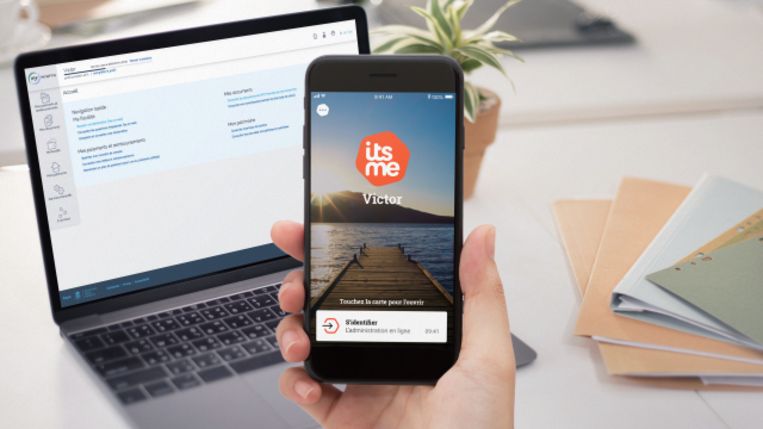Those who have to identify themselves online, for example to complete a tax return, were allowed to prepare themselves for a jingle tour a few years ago. ID card readers have proven to be as reliable as arrival times in central Brussels. Anyone who requested a so-called “token” for online registration had to wait for the letter to arrive in the mailbox. So much for the Internet.
With Itsme, that has finally changed. From now on, anyone can confirm their identity from a mobile phone with a simple security code. Since its launch in 2017, 6.5 million Belgians have already used it. Itsme quickly became a household name.
However, if it is up to the Secretary of State for Digital Matteo Michel (MR), there will be competition. It was announced on Tuesday that the government is working on its own version of the identification app under his approval. Development is in the hands of the BOSA Federal Public Service.
According to Michel, the new Itsme is part of the “digital wallet” that every Belgian should have by 2023. This wallet is a platform where all communications between the government and citizens are kept, and where everyone can access important documents. A budget of 50 million euros has been allocated for this purpose.
The news was immediately met with severe criticism. Because our country already has its own Itsme: Itsme itself. Since last year, the government – through the Federal Partnership and Investment Company (FPIM) – has been the largest contributor to the Belgian mobile identifier, which developed the app. SFPI owns one fifth of the shares.
Moreover, at that time, the government decided not to develop its own app. Instead, support will be provided to a specially created consortium of major banks (Belfius, ING, KBC, BNP Paribas Fortis) and telecoms companies (Orange, Proximus, Telenet).
Too late
According to critics, Michele’s plan amounts to a waste of money. “It basically sounds like an expensive and unnecessary joke,” says Frederic de Buschere, strategist at leading digital product studio In The Pocket. “Years ago, people didn’t want to invest their money in their own app, so they chose to support Itsme. Now they’re going back and developing an app anyway. Sorry: this strategy could have been implemented years ago, but it’s too late for that now.”
De Bosschere also points out that Itsme’s cost is more than just building a platform. “In addition to technology, adoption is also critical: Are enough people using your app? A lot of money has to be invested in marketing to convince people. And that will be difficult, because they already have a solution: Itsme.”
According to Michel, it is certainly not the intention to compete with Itsme from the market. It seems that the two can coexist perfectly. The Belgian version will only log in to the government, while banks also use Itsme, for example.

“We still think Itsme is a great system. But if you want to be a good family man, you should also look for an alternative,” says Koen Beauman, a spokesperson for Michelle. There is a fear that at some point Itsme will be sold to a foreign company, and that our country will no longer have sufficient control over the security of data processing.
The geopolitical background plays a role in this. The war in Ukraine and the uncertainty surrounding energy supplies from Russia confronted the West with facts: Those who outsource everything sometimes make themselves vulnerable to abuse. If millions of Belgians used an app for their communications with the government, wouldn’t the government manage that app better themselves?
But the truth is also that there is a great deal of fraud between the government and the Belgian mobile phone identifier. A few years ago, the law stipulated that our country would pay a maximum of 450 thousand euros annually for the use of Itsme. But in the meantime, according to sources, the company is asking for a lot, as a result of a technical discussion about what falls within the budget. On the other hand, the ceiling has not been reached in recent years. Last year 350 thousand euros were paid, and in previous years it was no more than 260 thousand euros.
Chief Civilian Officer Frank Rubin, the shadow daddy of federal IT systems, argued against Itsme a few weeks ago. According to him, the company behind the app is “unethically abusing its ‘precautionary stance'”. He suggested that the government should build an alternative itself.
However, there is a caveat: Robin – who heads IT services provider Smalls – is sometimes criticized for behaving like a monopolist. And if the government wants to create a version of Itsme itself, there’s a good chance that appointment with Smals will end sooner or later. No one in Michelle’s cabinet and the relevant government service could say on Tuesday whether Frank Rubin or Smalls were involved in the current plans.

“Total coffee specialist. Hardcore reader. Incurable music scholar. Web guru. Freelance troublemaker. Problem solver. Travel trailblazer.”







More Stories
Bitcoin price rises after new jobs data from US
European stock markets open higher | beursduivel.be
Russia’s oil imports to China decline